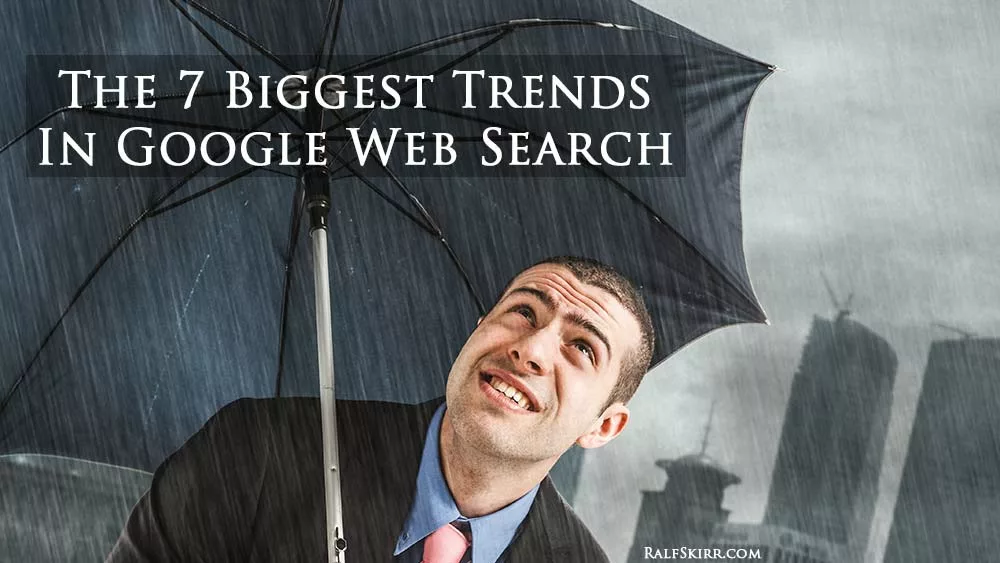
The 7 Biggest Trends In Google Web Search
Today I’m listing the 7 most important trends in web search that I think will soon spell disaster for businesses who rely on Google search to get traffic, leads, and customers.
I’m not saying you shouldn’t do SEO. But in my everyday work I see lots and lots of small businesses for whom Google search is the ONLY source of traffic.
For “internet marketing experts” it’s easy to forget that offline businesses don’t have our knowledge; they don’t have our enthusiasm for social media or content marketing. They don’t have viral YouTube channels, or whatever.
Google search is changing massively, and it’s going in a direction that ALMOST ALL small and medium sized businesses as well as many SEOs completely ignore.
Trends 1 and 2: How Google moves traffic away from your small or medium biz web site.
1. Direct answers. Googles goal is not to send searchers to your web site. Google’s goal is to answer whatever question a searcher might have. In an ideal Google world the searcher does not need to click away from Google at all.
The trend is that Google will answer all questions directly on the search results page .
Looking at the sometimes still questionable quality of current search results you may think Google is not technically able to so. But this is wishful thinking, and the future will prove it wrong sooner than most people would believe. Artificial intelligence is in the making. Google’s ability to provide answers is already improving at astonishing speed.
These machine generated answers will be shown prominently on SERPs, with traditional web site listings way below.
2. Authority over relevance. Now more than ever Google favors authority sites over “smaller” sites, even if content found on the smaller sites is more relevant to the search query.
Authority sites are those with the most pages, most back links, most frequent content updates, most frequent new content, and sites that have been around for years.
For smaller sites it will be increasingly harder to outrank authority sites. Soon the first SERP will be filled almost exclusively with authority sites.
Additionally 75,000 new domains are registered each day who also want to compete with you on Google’s top spots.
Trends 3 and 4: Why SERPs will lose importance.
3. Voice based search. What – in public perception – started with Apple’s Siri will become the norm in a few years.
People will change from using a keyboard to using voice. Often they will also get the answers to their search via voice.
Ask yourself: what’s the point of being on top of SERPs when the user doesn’t look at the SERP anymore?
4. Tiny Screens. While smart phones are getting bigger screens, we’re seeing new types of devices coming up with tiny screens. For now those are smart watches and glasses.
Both do not have enough screen space to show you traditional SERPs in an easy to skim and easy to use manner.
Once smart watches and glasses are well developed I expect other types of wearable computers which might not have any screen at all.
Trend 5 and 6 and 7: Why Google web search will lose importance.
5. Decline of Google web search market share. I’m using the term “web search market share” loosely.
Not in the statistical sense that compares searches between traditional search engines , but acknowledging that people increasingly perform their searches on sites other than search engine sites.
The most prominent alternatives right now are Facebook, YouTube, Twitter.
Every search performed on these sites is one where your top placement on traditional Google SERPs is wasted.
Apart from that I expect Bing to gain greater market share at the expense of Google.
6. Diversified Discovery. Not only will people more often search on sites other than Google, they will also more often skip “searching” completely and instead “discover” content.
For example instead of typing their query into a search box, they might type it into the status update box on Facebook and ask their friends instead of asking Google.
Or they might discover content by clicking #Hashtags instead of using Google search.
7. Alternative ecosystems. A few years back being online meant being within a web browser looking at the internet. Now traditional internet is losing viewing time to closed ecosystems separate from browser based internet.
The majority of those are smart phone operating systems. They do have traditional browsers, but they also offer tons of content jailed within apps with no direct connection to Google search.
Plus, people start viewing content on devices like Kindle, again being in a space somewhat separated from traditional internet and traditional SERPs.
Conclusion: For the seven reasons listed above businesses can expect to get less and less traffic from Google search. At the same time achieving top positions on search requires more work.
I’ve written a few posts about the risky changes in search before.
One feedback I got this week was that my last post on Google SEO raised a few eyebrows. ‘
This is the best I can hope for, and in this spirit I’m presenting these 7 search trends open for a lively discussion.